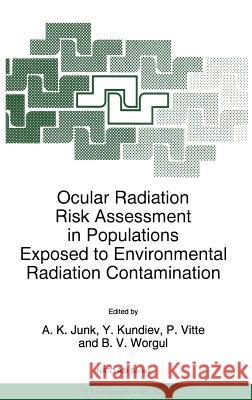Ocular Radiation Risk Assessment in Populations Exposed to Environmental Radiation Contamination » książka
Ocular Radiation Risk Assessment in Populations Exposed to Environmental Radiation Contamination
ISBN-13: 9780792353102 / Angielski / Twarda / 1998 / 225 str.
In former So\jet Union countries there are currently underway or being planned, several major ocular follow-up studies of populations exposed to radiation from reactor accidents, contamination from nuclear weapons manufacturing or fall-out from nuclear testing. The importance of such studies lies in their potential to provide the data necessary to: 1) help define the true extent of the impact of environmental contamination in affected regions 2) allow for a better appreciation of the degree of morbidity arising from such contamination 3) establish acceptable standards for ocular risk guidelines, 4) develop the necessary database to allow cataract to meet its potential in retrospective dose reconstruction, S) assess the contribution of environmental radiation exposure to the incidence of senile cataract development in populations at large. Given the complexity of such studies, the potential confounders, and the myriad of possible methods of assessment, it is in the interest of the global scientific and medical communities to, insofar as possible, standardize methodologies and agree upon minimum criteria to make inter-study comparisons possible. With this in mind the NATO Advanced Research Workshop (ARW) on "Ocular Radiation Risk Assessment in Populations Exposed to Environmental Radiation Contamination," 29 July - 1 August 1997 -Puscha Ozyorna, Kiev, Ukraine, was organized to establish minimum and standardized criteria for the acquisition, archiving, evaluating, and dissemination of data on the ocular risk of populations to environmental radiation exposure.











